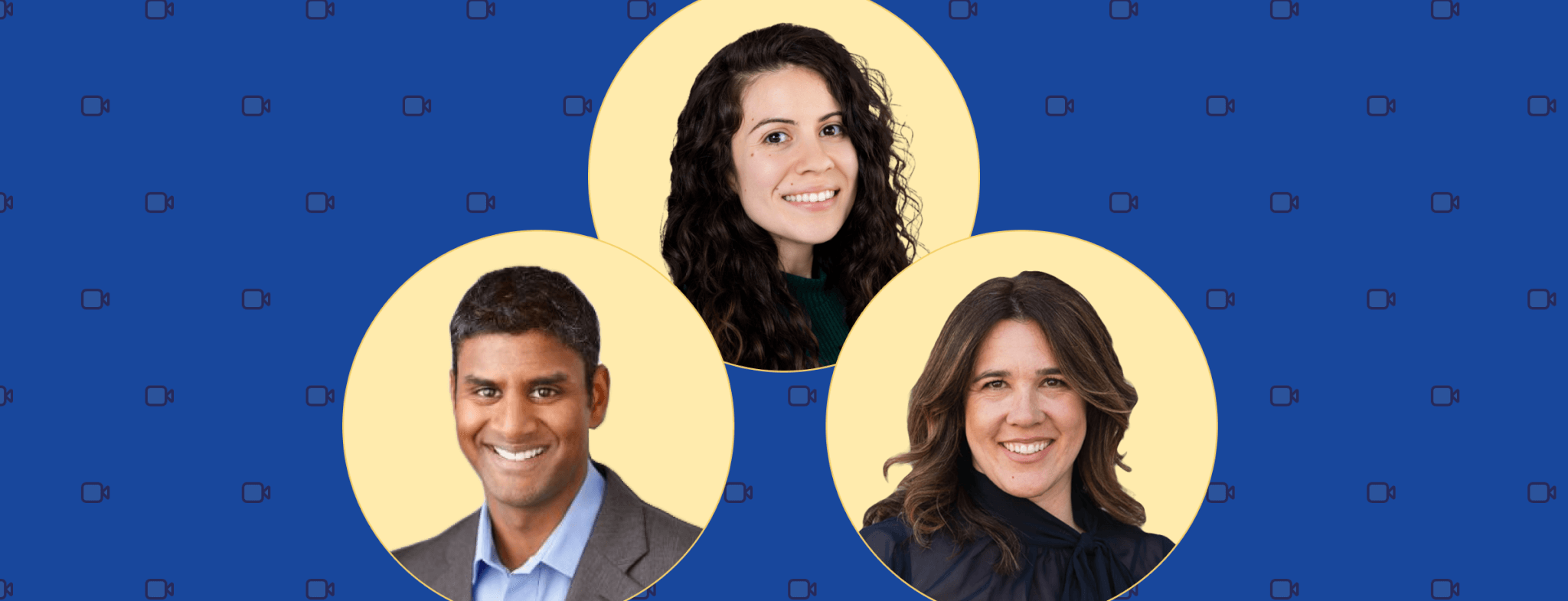Ethena's recent hiring and recruiting webinar focused on inclusivity, bias, diversity, and the candidate experience
On Wednesday, December 1st, Ethena’s VP of People Melanie Naranjo was joined by Jessica Yuen (former Head of People at Gusto) and Beth Axelrod (former Global Head of Employee Experience at AirBnB) to talk about best hiring practices from Startup to Global Enterprise.
We had such a blast learning the ins and outs of what makes an excellent recruiting process, and we’ve pulled together a few of our key takeaways below. (For a full recording of the call, scroll to the bottom of this post!)
For today’s hiring teams, the emphasis should be on the candidate as much as it is the company.
Both candidates and hiring teams are far more concerned about culture fit than they have in the past, including whether or not a company is diverse and inclusive enough for the candidate. “The candidate experience has become more important than ever” Beth noted. This means that hiring and recruiting teams should take extra steps to make sure that the candidate is as invested in the company as hiring teams are in the candidate.
When talking about candidate-company mutual interest and culture fit, Jess recalled a specific step from her time at Gusto:
At Gusto we had this intro call that we actually called a “Match Talk.” Because it wasn’t really about “Does this candidate meet our bar?” but it was like we’re trying to figure out . . . where you’re hoping your career is going to go and where the company needs to go . . . that there’s this nice intersection.
The best hires are inevitably going to be the ones that grow with your company, so it’s important to make sure that potential hires are aligned with where you want to go and how you’ll get there together.
Battling bias early and baking iInclusive practices into hiring mitigates problems later
Investing early in making an inclusive hiring process is the key to building diverse teams at a sustainable, scalable rate. Everyone on the panel has had hands-on experience working from companies growing by the hundreds (Jess, at Gusto) to the thousands (Beth, at eBay and AirBnB), and when asked about how to making a hiring process that’s both excellent and scalable with the company, the conversation often returned to the concepts of foundation, curiosity, and care.
“If companies start early, learn along the way, and get better at this as they move along, then when the company’s bigger, there’s already a baseline of capability around hiring inclusively.” Beth called out. And Jess added that “the challenge for [combatting bias in the hiring process] is the way to encourage the right behaviors through structure.”
When teams have a baseline of best practices and bias checks already built into their hiring processes, that saves them more time to invest in finding the best candidates for the role, no matter the stage of the company.
Diversity should be emphasized from the very beginning
Emphasizing diversity in staff is essential for the majority of hiring teams today, but actioning on this requires serious efforts at incorporating diversity, inclusion, and anti-bias into from the first hire to the thousandth–with a greater emphasis on the first.
In her experience working with thousands of potential hires for globally-successful companies, Beth emphasized that the earlier these values get incorporated into the hiring process, the better:
Companies could have diverse pipelines at the start of their recruiting process, but if the recruiting practices themselves aren’t inclusive and don’t block bias, then the successful candidates may not reflect the diversity of the pipelines. So we need to have both diverse pipelines and inclusive hiring practices.
And when it came to how to ensure more successful diverse hires on the larger scale, Beth shared her experience working with a modified version of the Rooney Rule:
Having a diverse slate requirement and requiring that the slate be diverse before it’s introduced to the hiring panel can be very helpful. Another example of a practice that helps is having diverse interviewing teams, so that candidates can imagine what it would be like to belong at a company like the one that they’re interviewing at.
Hiring inclusively (especially when aiming for diverse candidates) means making sure that the hiring process itself makes the candidate feel a sense of potential belonging–even before they accept the offer.
What sets a hiring team apart? Care, curiosity, and a focus on competency over experience
For all our talk of hiring foundations and structure, Jess noted that repeating the same hiring conversations won’t spell success in the long term: As human beings when we’re in repeated structure, we get bored, right? We’re creative creatures; we don’t want to ask the same questions over and over again.” Building a hiring team that emphasizes care and curiosity for a candidate as a potential coworker is paramount to making a dynamic, always-improving recruiting experience.
And, according to Beth, when you emphasize the candidate’s ability to fit the company and role over a candidate’s resume, hiring teams find opportunities to hire better candidates than they would through experience alone: “By focusing on competency, we essentially open the aperture on the pool of candidates that may be potential candidates for the role.”
When building a hiring team, Jess articulated that it’s important to make sure that the team is built with the understanding that a new role is a life-changing opportunity, for both the candidate and company: “Having that fascination around motivations and skills and life stories is something that allows recruiters or a hiring teams to be particularly exceptional.”
Thank you again to Beth, Jess, and Melanie for an excellent and thoughtful conversation! For those who missed it, we’ve placed the recording below.
Interested in how to train on best-in-class inclusive and consistent hiring practices, no matter what stage your company is in? Ethena’s got you covered with our Hiring & Interviewing course!
And to hear more thoughts on how to improve your hiring process, check out Melanie’s recent blog post, "We Need to Change the Way We Approach Job Descriptions."








